#just reinforcing my own optimism
Explore tagged Tumblr posts
Text
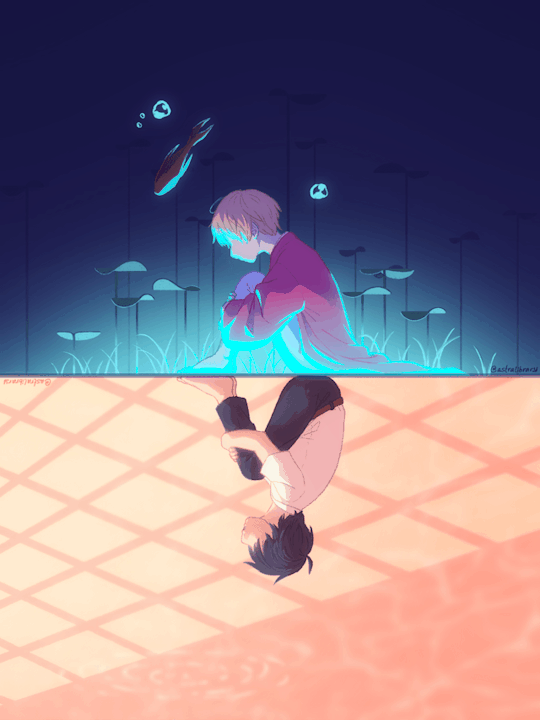
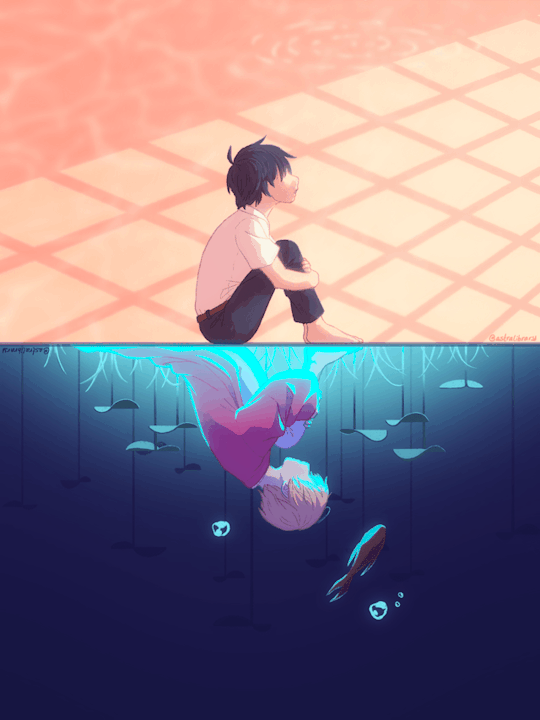
hi @marykedoesart, this is my gift to you for @natsume-ss' spring exchange!
you said you like tanuma/natsume and heartfelt, emotional themes so i went very symbolic with this, haha. i really love the idea of using imagery from the fish pond in tanuma's backyard to represent these two and their dynamic, so that became the concept i ran with. i'll explain my whole thought process below, but in the meantime i hope you like it! 💖
pls bear with me here bc this is going to be very long and wordy lol
so there's a definite theme of separate worlds here; while the environments are both pretty abstract, the idea was that tanuma is sitting in his house looking out towards his backyard where the pond is, representing the "real world," whereas natsume is in a more fantastical underwater setting, representing the world of youkai. also there's the implication that he's sitting at the bottom of the pond, aka completely immersed in that other world, while tanuma can only perceive hints of it in the reflected light & shadow on the wall.
tanuma's side is lit by the glow of the setting sun, and natsume's by an otherworldly blue light. also, there's their clothes: tanuma is in his regular school uniform while natsume is in a yukata, something that pretty much all humanoid youkai wear.
next, their poses; they're both sitting exactly the same way as a reflection of each other but natsume has his head bowed while tanuma is looking up; this is meant to represent their different approaches to their relationship. natsume is definitely more closed off, both as a defense mechanism and because he wants to protect tanuma & keep him away from the dangers of youkai. tanuma, though, is open and contemplative, maybe even hopeful; he wants to be let in and he wants to help, even if it is dangerous.
the lighting reinforces these conflicting attitudes, with tanuma's side being brighter and warmer while natsume's is darker and colder, representing this sort of "optimism vs pessimism" dynamic.
so now, the fish. the bridge between their different worlds, basically. on natsume's side it's a real fish while on tanuma's it's a shadow cast on the wall, which is obviously the original conceit of the scene in the source material: natsume can literally see the fish, while tanuma can only see its shadow. still, even if it manifests differently, it still exists to both of them, so it's a connection between them concerning youkai.
so they're both in their separate worlds, but because of this connection they affect each other, maybe in small ways at first; as the fish crosses over the barrier it leaves little effects, little disturbances behind. on natsume's side, bubbles drift up towards the surface, little pockets of air like little lifelines showing the way, and on tanuma's side little droplets fall and create ripples in the reflected water, these small things that grow and grow outward until they're not so small anymore. little feelings that bubble up and ripple out, hoping to reach the other in their own way.
the fish brings these feelings across the barrier, endlessly looping around them as they endlessly call out to each other, trying to navigate this relationship they have; it's possible to bridge the gap between them as long as they look and listen and learn to embrace the things that make them different just as much as those that bring them together.
and that's about it! my goal was to make a symbolic piece about their struggle to understand each other but with a hopeful note, so hopefully that comes across! i hope my explanation at least sort of made sense and wasn't too confusing! (to be completely transparent i only had about half of that in mind while i was drawing it, the rest sort of came together as i was writing this. neat!)
and finally, here's a still frame in the original higher resolution so you can see it a bit nicer! 💖
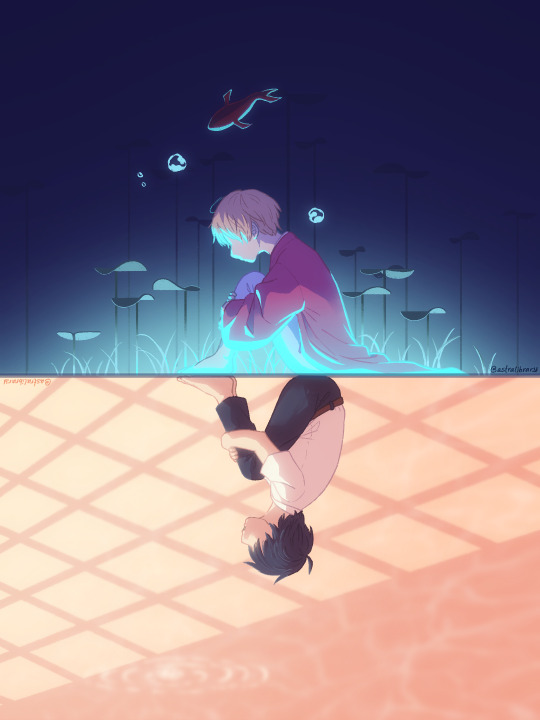
#natsuyuuspringex2024#natsume yuujinchou#natsume's book of friends#natsume takashi#tanuma kaname#tanunatsu#natsuyuuss: it's a smaller exchange so your gift can be more simple!#me immediately: I Am Going To Animate Something#and then i did!#i love these two and their magical fish imagery#and i hope you do too!#rieley draws#rieley animates#digital#fanart#(i will be posting on twitter too just. give me a min for that one lol#im not as used to formatting over there orz)
1K notes
·
View notes
Text
Have you ever hit your limit? Have you ever flown so close to the sun for so long you almost forgot your wings weren't real? That they could melt?
America, characterized in youth by his rugged tenacity, taking the underdog mentality of doing anything for a chance to win all the way to the top with himself, is scared of his limit. He's never hit it. He's won every battle he's waged and all the other ones the world had (key word lol) picked against him. Challenges are fun, even if they blow up in his face, because they can eventually be overcome. It's the mentality of a winner, of being number one. His optimism and confidence are owed to the fact that they've really never failed him, since he's never failed himself.
I think this is best demonstrated in world stars ch. 527, as Russia pretty much says the same thing. The transition from America crying to England to Russia is not only a good joke to breakup the escalation but reinforces that what bothers America most is his inability to punch everything away. It becomes a source of fear. Ghosts, his own faults, the dark, etc. Failure scares the perfectionist who's always won.
(using @/withnofreetime 's translation of the last two pages of ch. 527)


tfw your coworker is a "genius perfectionist" who's a wolf in sheep's clothing because he'd rather lie than admit weakness (considering he just lied about not having debt)
While they're supposed to be more human here than their normal personifications, America's line of "that's not my story" makes sense both here and in normal canon. Technically, he has, at one point, known and dealt with and worked under people stronger than himself. Endurance isn't strength and strength isn't always the best leverage when you lack in other ways materially (the assets, the tech, the capital) or in pure collective manpower. However I think it says something that a more mortal interpretation of these characters is quick to focus on America's now very human limitations.
If all you have is tenacity, then you gotta have some tactics. What does it mean to win? Well, we can assume in part it's about Total Control. Even if you're losing the material battle, or the intellectual war, you can "win" in the social narrative and thus maintaining your reputation by staying unflappably confident. Bulldozing works in terms of clout, and if power/winning/control is about other people, so long as you have clout, you can do whatever you want forever and ever.
So if you're used to maintaining your narrative, maintaining your social clout - all of which revolve around a sense of "total control" (which incidentally is also an aspect of Being Entertained, something America frequently seeks out) - being hit while you're down is probably the best way to get one over on America. And watch him fall into the ocean under the weight of his own melted metal.
100 notes
·
View notes
Text
Concept: After everything at the airport Mori brings Atsushi to the Port Mafia. And even with the deal in place Atsushi has to plead his case.
(Since we’re talking about the parallels between Atsushi and Chuuya.)
Mori’s expression didn’t change as Atsushi gave him the full run down of events. He was the picture of calm and composed. It made Atsushi wonder how much of it was how he actually felt.
If Fukuchi had been the man of a thousand faces. Then who knew how many masks Mori had at his disposal.
“You’ve had quite the day” Mori said finally. As if Atsushi had been talking about the weather. He wasn’t sat at his desk but a lone chair infront of the large windows of his office.
“You could say that again…” mumbled Atsushi before he could stop himself. He felt so small in this large imposing room. The guards by the door only reinforcing that he was in enemy territory.
One wrong move and he was dead.
“But while I offer my sincere condolences, I fail to see how any of this is my responsibility.” Said Mori, sounded almost bored by the whole interaction. Atsushi stared at him in surprise as he continued.
“The Port Mafia has sacrificed a great deal in the name of aiding the Armed Detective Agency.” Said Mori, eyes sharp as he took in Atsushi. “So give me one good reason why I should help you.”
A cold chill went down Atsushi’s spine.
Mori’s words rang in his ears like alarm bells. It was true that the Port Mafia had suffered in this battle with Fyodor. Akutagawa’s death, being the centre of the vampire outbreak.
And yet, Mori had never shied away from helping the Agency. Even when he said no to the initial alliance offer, Mori still offered his aid over and over again.
If he truly saw no reason to work with Atsushi. Then why did he save him at the airport? Any alliance between the two organisations would’ve died with the Agency. And even then Mori only worked in his own interest. He had no reason to save Atsushi.
Or did he?
And just like that everything clicked into place.
“Game theory dictates that the optimal response to an enemies attack is to fight back with everything you have.” Recalled Atsushi. “That was the advice you gave me back in Anne’s Room.” He shook his head “you could’ve let me escape.“
He could’ve chosen not to intervene as he had done prior. He could’ve let Atsushi abandon his friends behind. But Mori had instead stepped in and given Atsushi the resolve to fight.
“It would’ve weakened the Agency and benefited the Port Mafia. But you wouldn’t let me because it would’ve harmed the city.” The love for this great city was the one thing that Fukuzawa and Mori could ever agree on.
It was why Atsushi proposed an alliance between the two organisations in the first place. Despite everything the Port Mafia had done to him. Atsushi had looked past his anger for them and seen how far they were willing to go to protect the city.
And taking out the Agency meant that the Tripartite framework would no longer be effective.
“You could’ve left me at the airport to die. But you know what my ability is capable of.” In a glow of blue light his arm transformed. It alerted the guards but Mori stopped them by simply raising a hand. His eyes trained on Atsushi’s tiger claws.
Bingo.
“And you know how powerful mine and Akutagawa’s abilities are when we work together. And when they’re combined. That kind of power will be needed to end this enemy before they have another chance to strike.”
Fukuchi had said that day that “the reason you lost is because you let me draw this sword’ that’s what Fukuchi had said that day. They’d won in another time, Fukuchi had all but confirmed it. But drawing that sword and striking it before death had saved him.
It was a mistake that could not be made again.
Mori hummed thoughtfully. “That may be true. But your power on its own was said to be the key to destroying the enemy. And yet here you stand before me as the sole survivor of the Armed Detective Agency.”
His gaze seemed to pierce into Atsushi’s soul.
“If your the key, then why is the Agency not here?” It felt like a taunt and Atsushi should’ve gotten mad. Instead all he felt was despair. His own failures striking him over again.
The blood on his hands that Atsushi could never wash away.
“They were taken out one by one. We barely had time to act. That…thing moved faster than light. But the reason the enemy is still here is because everyone was trying to protect me.“ Said Atsushi quietly.
He hung his head in shame.
“It’s all my fault.”
He clenches his fist as it returns to normal. He didn’t have the luxury of breaking down right now.
“But all that matters now is stopping Fyodor. You saw what he did at the airport. That’s only the beginning.” After all Fyodor wanted the book above anything else and the book was in Yokohama.
“I’m not smart enough nor am I strong enough to go against him alone. My friends are gone. And you’re all I have to turn too to defeat him and save this city. To that end….”
Atsushi dropped onto one knee before Mori.
“I will dedicate my blood and all that I am to you, Mori Ougai of the Port Mafia. I will protect this city and this organisation that you head. And I will work for you to decimate our enemies. To follow the plans you have carefully laid.”
The silence that followed threatened to engulf him but Atsushi didn’t move.
“Welcome to the Port Mafia, Atsushi Nakajima.” Atsushi raised his head, surprised. And for the first time since he’d entered this office Mori’s expression changed to a pleased smile.
This test was one Atsushi had passed.
“Come now, we have much to discuss.” Said Mori, the guards parting to let them both pass. With Atsushi walking behind him. “There is something you forgot from our talk that day” said Mori. His voice a lot more pleasant and like the shy doctor Atsushi met in Anne’s Room.
But there was a strength, an assurance within him that made it clear to all he was in charge here.
“What did I miss?”
“No enemy is more vulnerable than one convinced they can’t lose.”
#idk#bsd atsushi#bsd mori#bsd#atsushi nakajima#mori ougai#bungou stray dogs#bsd spoilers#bsd manga spoilers
50 notes
·
View notes
Text
Old-school planning vs new-school learning is a false dichotomy
I wanted to follow up on this discussion I was having with @metamatar, because this was getting from the original point and justified its own thread. In particular, I want to dig into this point
rule based planners, old school search and control still outperform learning in many domains with guarantees because end to end learning is fragile and dependent on training distribution. Lydia Kavraki's lab recently did SIMD vectorisation to RRT based search and saw like a several hundred times magnitude jump for performance on robot arms – suddenly severely hurting the case for doing end to end learning if you can do requerying in ms. It needs no signal except robot start, goal configuration and collisions. Meanwhile RL in my lab needs retraining and swings wildly in performance when using a slightly different end effector.
In general, the more I learn about machine learning and robotics, the less I believe that the dichotomies we learn early on actually hold up to close scrutiny. Early on we learn about how support vector machines are non-parametric kernel methods, while neural nets are parametric methods that update their parameters by gradient descent. And this is true, until you realize that kernel methods can be made more efficient by making them parametric, and large neural networks generalize because they approximate non-parametric kernel methods with stationary parameters. Early on we learn that model-based RL learns a model that it uses for planning, while model free methods just learn the policy. Except that it's possible to learn what future states a policy will visit and use this to plan without learning an explicit transition function, using the TD learning update normally used in model-free RL. And similar ideas by the same authors are the current state-of-the-art in offline RL and imitation learning for manipulation Is this model-free? model-based? Both? Neither? does it matter?
In my physics education, one thing that came up a lot is duality, the idea that there are typically two or more equivalent representations of a problem. One based on forces, newtonian dynamics, etc, and one as a minimization* problem. You can find the path that light will take by knowing that the incoming angle is always the same as the outgoing angle, or you can use the fact that light always follows the fastest* path between two points.
I'd like to argue that there's a similar but underappreciated analog in AI research. Almost all problems come down to optimization. And in this regard, there are two things that matter -- what you're trying to optimize, and how you're trying to optimize it. And different methods that optimize approximately the same objective see approximately similar performance, unless one is much better than the other at doing that optimization. A lot of classical planners can be seen as approximately performing optimization on a specific objective.
Let me take a specific example: MCTS and policy optimization. You can show that the Upper Confidence Bound algorithm used by MCTS is approximately equal to regularized policy optimization. You can choose to guide the tree search with UCB (a classical bandit algorithm) or policy optimization (a reinforcement learning algorithm), but the choice doesn't matter much because they're optimizing basically the same thing. Similarly, you can add a state occupancy measure regularization to MCTS. If you do, MCTS reduces to RRT in the case with no rewards. And if you do this, then the state-regularized MCTS searches much more like a sampling-based motion planner instead of like the traditional UCB-based MCTS planner. What matters is really the objective that the planner was trying to optimize, not the specific way it was trying to optimize it.
For robotics, the punchline is that I don't think it's really the distinction of new RL method vs old planner that matters. RL methods that attempt to optimize the same objective as the planner will perform similarly to the planner. RL methods that attempt to optimize different objectives will perform differently from each other, and planners that attempt to optimize different objectives will perform differently from each other. So I'd argue that the brittleness and unpredictability of RL in your lab isn't because it's RL persay, but because standard RL algorithms don't have long-horizon exploration term in their loss functions that would make them behave similarly to RRT. If we find a way to minimize the state occupancy measure loss described in the above paper other theory papers, I think we'll see the same performance and stability as RRT, but for a much more general set of problems. This is one of the big breakthroughs I'm expecting to see in the next 10 years in RL.
*okay yes technically not always minimization, the physical path can can also be an inflection point or local maxima, but cmon, we still call it the Principle of Least Action.
#note: this is of course a speculative opinion piece outlining potentially fruitful research directions#not a hard and fast “this will happen” prediction or guide to achieving practical performance
27 notes
·
View notes
Text
Continuing my post from yesterday to break down why Serena was disrespected by Ash in this scene
Because of the image limit and because the image limit has been reached
1
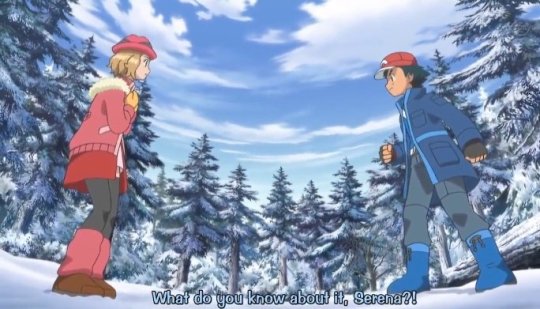
Still breaking down the whole situation of this sentence being disrespectful to all the help Serena offered him on the journey.
She was the one who lifted you up and gave you advice to get out of your shit when you were bad at the gym.
THAT'S what she gets? DAMN
They call my girl submissive the whole anime and when she can't handle Ash disrespecting her and yelling at her
THEY GO CRAZY LMAO
You can't just throw that PHRASE out there and expect no one to get mad about it
No one can yell at Ash or react
No one can hit him or call him out
No one can get mad at him over some triviality.
No one can get mad at him if they're a female character
If it's a man, you can
I'll tell you what it is, midnight...
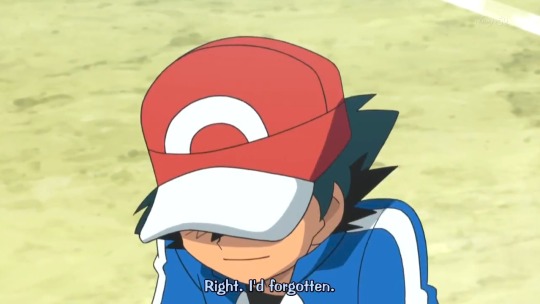
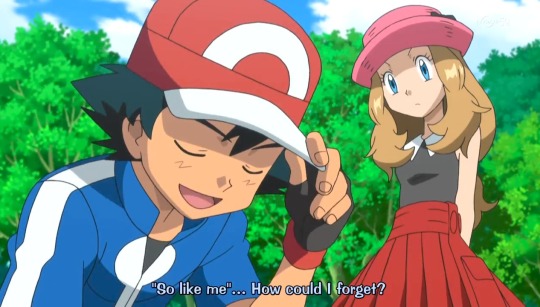
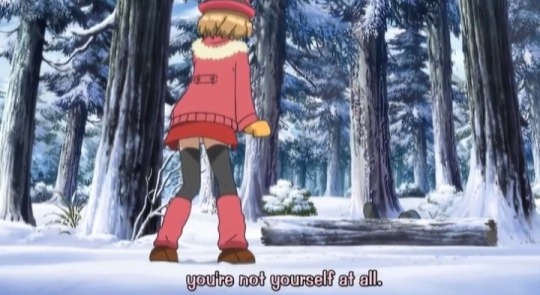
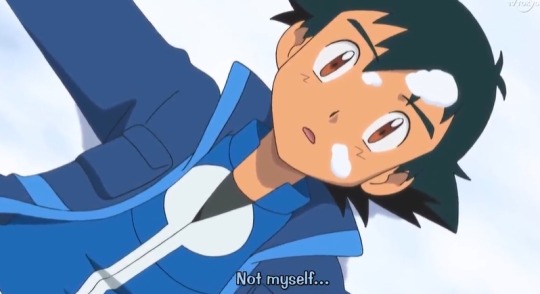
Parallels, this scene is totally a situation from the first gym where Ash found trying to improve from a loss and in an attempt Serena calls him back to his best and to try again after hards loses (remembering that BW was a sequence of XY here)
"It's so disappointing to lose
I'm trembling, but,
My clenched fist loosens
I wipe the sweat on my jeans, so let's shake hands!
Isn't the flow of time mysterious?
"Do you remember who won?"
Now look!
I can laugh as I talk with you
"I forgot!" said while playing dumb
Those are my rivals' - Rivals' OP (OS)
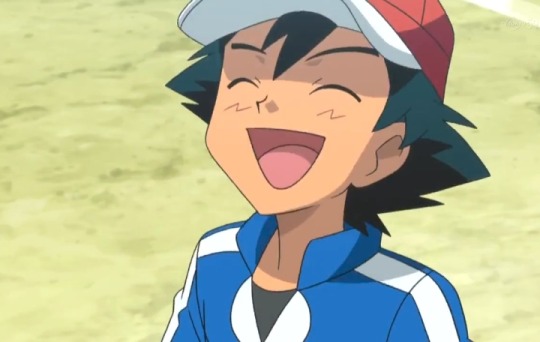
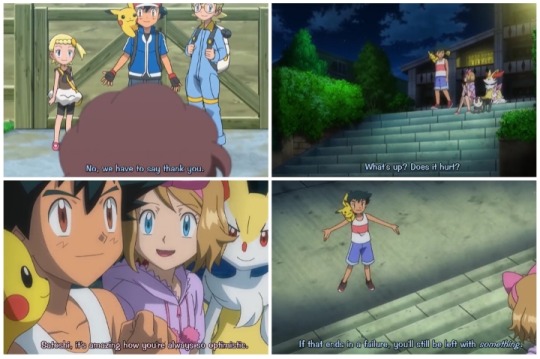
The show is always talking about thanking her for everything she does for her friends in that sense and not just for him. The show does nothing to fix the flaws in Ash's optimism, only to reinforce it (not new, by the way).
"I have to go, I have to do it
I can't lose, I can't stop, not until the end
I'm not alone, I'm not lonely, still a way to go
This exciting adventure isn't over" - Challenger
have to go, I have to do it
I can't lose, I can't stop, at any time
I want to help, I want to protect you during painful times
I can't turn around, I can't lie down
I can't get depressed, I can't give up, I believe
I won't rush, I won't get confused
I always aim for that distant dream..." Challenger
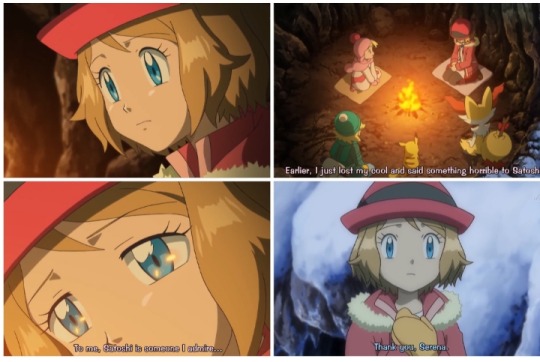
But he's being unreasonable here, and Ash's depression is no excuse for him to throw away all the help he got from her
He makes up with Greninja,he talks to Pikachu,but he doesn't apologize for saying that to her
She blamed herself and said "I said horrible things" but so did hesame in his angry state and the show doesn't address it.
Even if you are angry, you can't just hurt people's feelings.
He thanked but did not apologize.
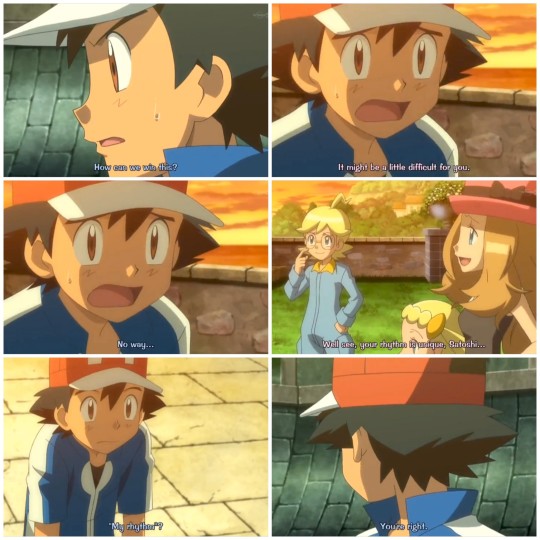
She helped you remember your own self, as the words themselves describe, they may not be talking about Serena herself, but they may have been used as inspiration for these scenes in her character.
That's what the Snowbelle arc is about, it's about Satoshi and Serena themselves. People say Ash is out of character here when everything says otherwise in his own characterization.
SHE STILL DOESN'T DESERVE WHAT HE SAID
💖🫶
Thank you for reading this again, anyway. The show builds Ash's character like this from the beginning and Serena's character has supported him through everything in the same way.
She deserves more recognition than just being called "submissive" that's pure misogyny really.
31 notes
·
View notes
Note
Hi there again! I have a few questions regarding AM and his anatomy.
Ok so does he have organs? I’ve read in one of your post that he does have wires within his body but in another post where AM first uses his organic body it said “The air in his lungs hurt.”
So he has lungs??? I don’t know I’m just curious.🧐And if so how does he process food? Is it similar to us or not?? I know he doesn’t need to eat, but since Vernon shares her food with him I just couldn’t help but wonder…😀😄
Also, I promise I’m not stalking you or anything I just really love your art and the way you interpret ihnmaims!!! 🩷Your art makes me want to mediative daydream, it makes me so happy it motivates me!😭
Howdy Dislocatedcat! Thank you for the ask, sorry it took so long to answer, since I got it since it has been keeping me up at night trying to make sense of it in a logical way. I would draw out the Anatomy of AM, but it's kind of...gross? Not innards in of themselves, just his.
AM's Anatomy
A machine will cut things out of its system in order to make sure it works the fastest. AM streamlined his body to optimize efficiency and functionality.
By eliminating non-essential organs like the spleen, kidney, and appendix, he reduced the risk of potential medical issues and minimized maintenance requirements. This allows him to focus his energy and resources on tasks that require higher cognitive functions and physical performance. So yes he has organs and wires combined :)
His Heart
Vernon has made comments about him not having a heartbeat, which is simply not true! He does ,in fact, have a heart, it just beats so slow she can't hear it.
It beats slower than a typical human heart because his body requires less frequent circulation due to enhanced metabolic processes and possibly more efficient oxygenation and nutrient delivery systems (the immortality serum). The heart may also be reinforced or partially mechanical to ensure durability and consistent performance.
His Lungs
AM has lungs, yes, but they are likely designed to be far more efficient than human lungs. These lungs facilitate effective oxygen exchange and are regulated by his AI consciousness to meet the optimized metabolic needs of his body.
His Digestive System/Stomach
AM has taste buds and enjoys flavours just like a normal human. The initial stages of eating—chewing and swallowing—are similar to any other person.
While he might retain essential digestive organs like the stomach and intestines, these organs could be enhanced or partially mechanical. This could involve more efficient enzymes, faster digestion, and improved nutrient absorption mechanisms.
AM’s body has an optimized waste management system, efficiently filtering and expelling waste products. This could involve advanced filtration mechanisms that reduce the need for frequent eliminations.
Waste products are minimized through a highly efficient filtration system. Excess and non-usable components are quickly identified and directed for excretion.
I'm not a medical professional nor deal with organs (other than my own, god forbid) on a daily basis, so some of this is probably inaccurate. But if you made it this far, thank you for reading!
#ihnmaims#am ihnmaims#i have no mouth and I must scream#am i have no mouth and i must scream#allied mastercomputer#writings#headcanons
56 notes
·
View notes
Text
Beast and Dark Beast
The thing that gets me about the 'Dark Beast is just who Hank is given time' thing I see thrown around every now and then is that it fundamentally misunderstands literal decades age characterisation and the entire narrative point of the evil doppelgänger.
Like, I genuinely think that anyone who writes these characters almost has to be sat down and made to read X-Men Unlimited vol. 1 #10, and that's not an exaggeration, because Dark Beast is NOT Hank if he was evil. What he is, is something more subtle and interesting than that. He is Hank if his socialisation was completely different, and that's a fundamentally different thing.
He grew up in an aggressively social Darwinist society that was obsessed with genetic purity, the superiority of mutantkind, the codification of the idea that some people are just better because of their genes. Literally everyone in that world is different, because how in god's name would they stay the same?

On some level, Dark Beast is aware that his world is fundamentally cruel and without faith and optimism and belief and love. It's a fucking hellpit. It's the worst possible world. And he knows that. He knows, on some level, that there was a time where he wasn't like how he was, that there was a time where he did have faith. He is, on some level, aware that this is not all he could be.
But he also believes that this is all he can be, because to be anything else is to be weak, and thus you get your teeth kicked in and you get your lunch money taken away and you get shanked in the head.


Like, this sequence is so fascinating because this murder is meaningless except as performance - and performance for a world that Dark Beast isn't even in anymore! It's empty.
Someone has to die - why? Because that's just the way the world is. Because if someone doesn't have to die, then my entire worldview is meaningless, I could have made different choices, swam upstream, maybe died as a result, but at least I wouldn't have done all that. Because if someone doesn't have to die, then everything I did was actually just straight up evil and I have to start worrying about morality, and that feels bad. That makes me feel weak and unhappy and angry and ashamed and I don't like that.
If someone doesn't have to die, then I could have made different choices. And I don't like the idea that I made the wrong ones.

Morality is subjective. Science is absolute. I don't have to think about it. Like, Dark Beast criticises Hank for this, but it gets at why Dark Beast has never been half the scientist Hank is, never will be half the scientist Hank is.
Because he is fundamentally incurious. He's asking questions, but they're not the right questions if you ever want to get an answer that fucking means anything.

He'll never be the scientist you are, huh?


Go ahead, loser. Fucking solve it. Best guess.
Oh, you don't have a fucking clue? I'm shocked.

There's a reason that Isaac Newton said that, "If I have seen further, it is by standing on the shoulders of giants." Collaboration, peer review, question, counter-question, interrogation, inquiry, the simple act of asking, hey, what if all of this is completely wrong and we're looking in the wrong place? All of this is what science actually is.
It is not the act of pinioning flesh open and poking at what falls out. That's butchery, and it's hackery. There's a reason that pretty much all of the medical research conducted by the Nazis has been discredited, because it's bad science on top of being completely morally abhorrent! You don't learn anything through brutality! You only reinforce your own brutality! You go looking for answers, and you find them, because anything that disagrees with your preconceived notions, you ignore!
And Hank is not like that. It's no coincidence that the exact same issue that dives into Dark Beast's psychology has this scene in it.




And it's just. This is not an aberration in Hank's writing. This is how he's hard coded. This is who he is.








Choice.

Hank was given a choice. Dark Beast wasn't. And the difference between them is that, when given further choices, Hank continued to recognise that he had choices, while Dark Beast refused to admit that he had ever had a choice.
The point. Of the evil twin. Of the doppelganger. Of the shadow. Is to examine what changes, and what doesn't. There is a reason that Dark Beast was chosen to survive the Age of Apocalypse, and persist 30 years past the point where his timeline was truly relevant. There is a reason that he was chosen over AoA Cyclops, or AoA Wolverine, or AoA Jean Grey, or any of them, to come over, and persist, and survive. There is a reason he keeps coming back to life. He has died twice, and come back, for a reason.
Because he is interesting. Because he's fun. Because he's everything that Hank is, twisted one hundred and eighty degrees and made frightening. Because he is such a contrast to Hank. And it's just. It's such a betrayal of long form storytelling and narrative techniques to take one look at the good twin, and go, what if they were secretly always evil, actually? What if the evil twin was actually just foreshadowing?
It's fucking boring.
Evil Hank is 'we have Dark Beast at home.' Evil Hank is dull, and boring, and an edgelord's idea of a mad scientist. He is not curious, he is not funny, he is not interesting. His entire ethos can be summed up in one sentence, the ends justify the means, and that's it. There's nothing more to him. He's a joke of a character. Can you write anything substantive about that version of character that isn't just a summary of his bad choices? No, you can't, because he's a collection of shitty tropes and badly researched continuity pulls. There's no point talking about him.
What happens if you put evil Hank in this situation?



Like, legitimately. If you put X-Force Beast in this situation, is there any real question as to what he'll do? No. And that is boring. It is, quite literally, actually, factually, in the most basic definition of the word, predictable.

This is the single most intriguing panel that Dark Beast has ever been in, because I genuinely don't know what he's thinking. I don't know what he's going to do. Because I don't think he knows what he's thinking, or what he's going to do. He's overwhelmed. He's emotional. He's possessed by something, but he doesn't have words for it. It's not absolute, it's subjective. It doesn't make sense. It's illogical. Irrational. It infuriates him. It fascinates me.
That, is the narrative point of the evil doppelganger. To put a version of a character you know in a situation where you know what the good version would do, and see what they would do. To see what changes, and what doesn't. So that you can be surprised at what is the same and what is different.
Saying, well, actually, they've always been exactly the same person, is fucking stupid. It betrays a belief in, fuckin', in fuckin' genetic essentialism! That all we ever are is a product of our genes and that we're never destined to be anything than what a string in our genes says we are. And it completely misunderstands why Dark Beast is the way that he is!

Dark Beast did not come into the world a monster. The world he lived in made him a monster. If you want to say that Hank is Dark Beast, just given time, then what the fuck are you saying about the world that mutants live in? That the X-Men have created? About Earth-616?
Do you really want to imply that the Marvel Universe is such a fucking hellscape for mutants that it literally has the exact same effect on Hank McCoy as the Age of fucking Apocalypse? Because why in the fuck should I even read about the X-Men, if that's what they've managed to accomplish in their 60 years of publication? What great fuckin' heroes.
Like, just. What actually happens to Hank, given time? What's more common for him to experience? Across the multiverse?
Mutation.

Misery.

Betrayal.

Death.

Seriously, go back and read old What If comics, and you'll notice that almost any time that things go bad for the X-Men, Beast dies, almost immediately, because it's an immediate sign that things have gone wrong. It is way more common for Hank to be the one who suffers rather than inflicting suffering, canonically. Just because Dark Beast is the only one people know about doesn't mean that he's the only one who exists.
Dark Beast is not an inevitability. He's an eventuality. He's a case study in nature vs. nurture. He's the worst case scenario. He's the shadow cast by Hank's light. There's a reason Hank persists, even damaged by bad writing as he is - because he's worth reading about.
Because he's interesting. Because, despite being 61 years old, there are still stories worth telling about him.
Because fundamentally, funny blue man who looks like a monster but is actually a good guy, is a better concept than, blue monster man that is evil and only evil. And the fact that people don't seem to grasp that idea in 2024 is. Baffling, to me. The fact that people would rather the boring answer, because it appeals to the edgelord in them, just makes me want to roll my goddamn eyes.
Bleh. Thanks for coming to my Ted Talk. Ask for better, more complex stories, please.
41 notes
·
View notes
Note
How do you avoid becoming a doomer with politics? I want to be more politically active but the current political climate makes me feel depressed.
talked more about this here but essentially, nothing is static. Conditions change all the time, the quantity of organized people can fall and rise (with parallel but not necessarily 1:1 development of quality). What today seems like an impassable wall, tomorrow (not literally tomorrow) will more and more began to be seen as a necessary step for an improvement to happen. The fact that there exists a scientific method of analysis of history and capitalism also acts as an accelerant; how much time passed between the first bourgeois state and the first formulation of scientific communism, 50 years? That is unprecedented in the history of modes of production, and it only took another 50-60 years after that before the first relatively permanent instance of the next mode of production.
The way I see this, inaction and pessimism feed into each other, pessimism favors inaction, and inaction reinforces pessimism, by limiting your perception because it limits personal experience. And that cycle can only be broken by first stopping that inaction, since it is possible (not always) to force yourself to act against your general feelings. And then, only by working against that inaction and finding an organization/party or general line of action that works for you, can you begin to sustain an action-optimism cycle (of course, it isn't this simple and I would not call my outlook to be optimistic, but this is the best way I can think of explaining this). This cycle is, in my experience, very fragile, and somewhat often I continue to act through periods of relative pessimism by inertia and by the continuance of the responsibilities that bind me to my party most strongly. I can keep talking about the way society and the economy evolve, but at a personal and more inmediate scale, this is the only way to avoid "doomerism", at some point you're going to have to start acting if you want to avoid it, and rethoric can help, of course, but you'll only start to internalize it once you experience becoming an active part of these mechanisms. For me, it sometimes feels like a hobby, other times like a chore, and most times like the best thing I could ever do with my life. But it's crucial that you're not only driven by blind hope. The amount of effort and time you can contribute as an individual will vary wildly, depending on your own personal circumstances, and in my experience the most common type of organized person you'll encounter is the one that can only really dedicate a few days a week or a couple of hours every few days.
There is some nuance to "you have to end your inaction" too, of course. I'm not saying to join the very first group you encounter and dedicate every minute of free time to it, but you also can't be waiting for the perfect opportunity or org to come along. I contacted my ML party on a Tuesday during a winter academic break, while I was only just beginning to stabilize out of a suicidal episode but still depressed, and while considering myself mostly an ancom (I was very lost in that regard, my beliefs were not truly emergent from any proper anarchist core, but I digress). You don't need to have read x books or need to have encyclopedic knowledge of your local movement to begin to organize yourself, and you also don't need to believe 100% in the emancipation of workers. The best time to begin is the next time you have some free time to research and begin to contact some orgs/parties, that's as best as I think I can put it. I can't assure you that it'll be straightforward, but I can assure you that you can't get out of doomerism just by thinking about it.
If it's too daunting, think about those executive dysfunction "tricks". Joining A Party can sound very big an unapproachable, but you can break it down into looking, for example, for "Communist Party of [your country]". Look at their socials, see what they do and say, maybe you find an offshoot org that looks better, or run into a completely unrelated group. Then you contact them, ask when they're doing something in your area or if they can invite you to some kind of meeting, etc. Be willing to contact them if you find a couple of drawbacks too, sometimes rumors turn into the thing everybody says about x or y org, without really reflecting reality. Have criteria, of course, if some org is talking about immigrants like they're invaders, for example, it is probably not worth your time. Everything depends on what your local scene looks like. Getting experience at a mediocre org is still better than staying at home and looking on at the state of the world like it's hopeless. this isn't a very well-structured post, I've been writing this across a few days when I can, I hope it's helpful
32 notes
·
View notes
Text
I already talked about, like, the Obvious Symbolism of Simon reaching his lowest point literally dressed like the Ice King and then gradually gets back to his old outfit as he starts climbing out of his depressive spiral, at least somewhat.

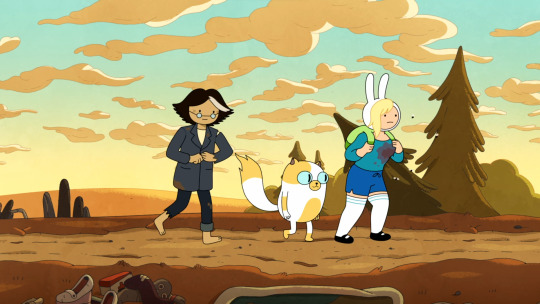
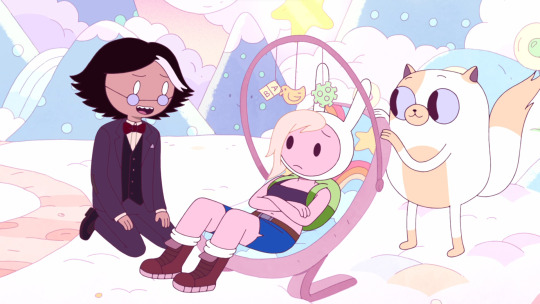
But it’s also really interesting, maybe even more interesting, how Fionna’s outfit has been gradually shifting and changing with basically every adventure.
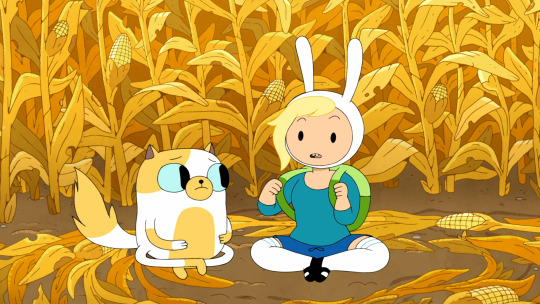

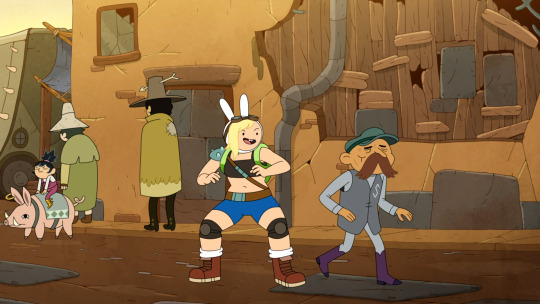
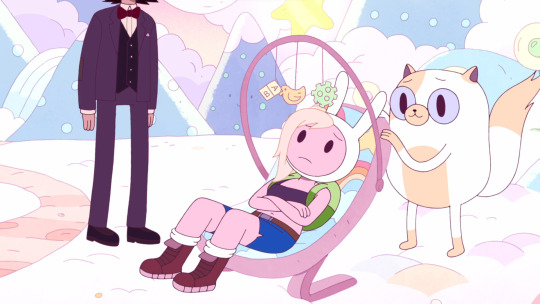
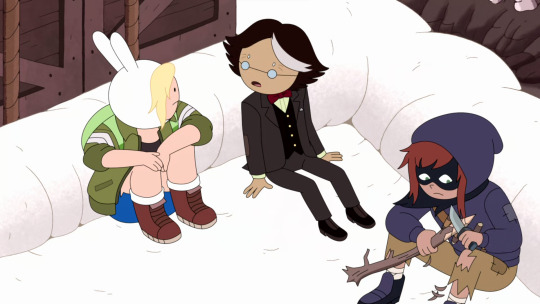
My first thought was that it really shows Fionna coming into her own as a character. The more she grows and also the more character development she gets - the more the audience learns to see her as more than just Girl Finn - the more her outfit moves away from just being a slightly girlier version of Finn’s classic look and into being its own thing.


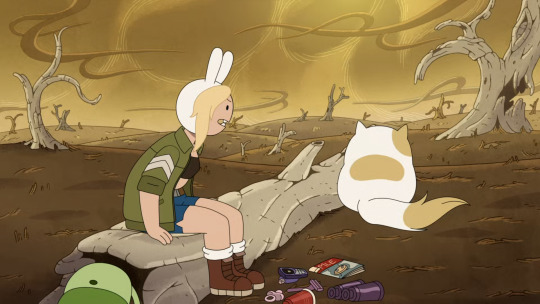
Because Fionna is her own character.
But my second thought was more about the first time Fionna’s classic outfit got an update in this series.
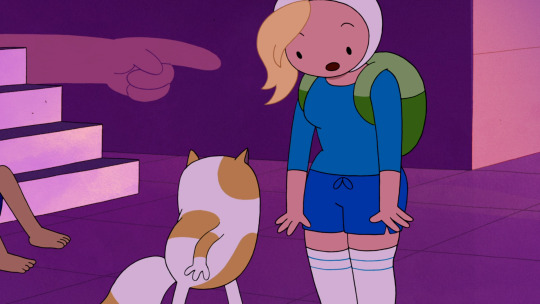
This wouldn’t really relate to my first reading, since it just kinda makes her outfit closer to Finn. But it does relate to the most important Theme that her character arc revolves around - Fantasy versus Reality.
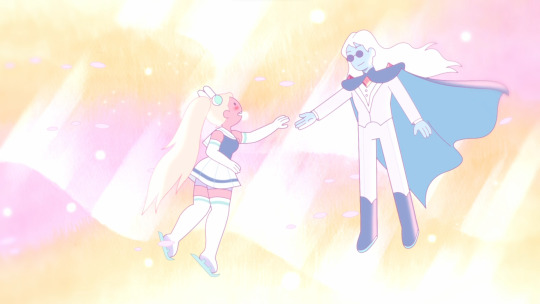
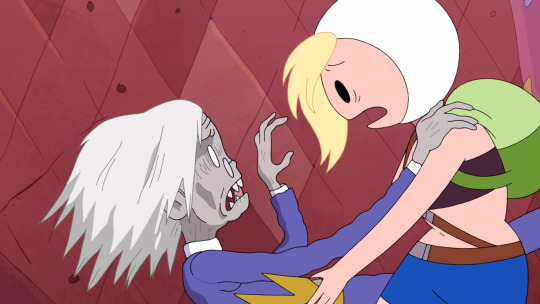
Fionna starts out the story interacting with the idea of magical adventure and heroism via the lens of fantasy. She compares everything to video games and just thinks about everything in terms of it being cool and fun and she literally tries to chase down a person from her dreams.
And her mindset was probably only reinforced by discovering she was literally created to be the Main Character in God’s little fantasy universe literally created out of self-indulgence for his silly little stories.
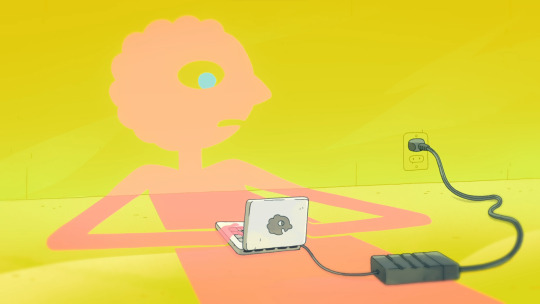
And because of that, she starts out the story with a huge Protagonist-Centered-Morality blind spot where she can’t recognize when she and Cake are in the wrong

And she rushes into action and violence just thinking it’s ‘cool’
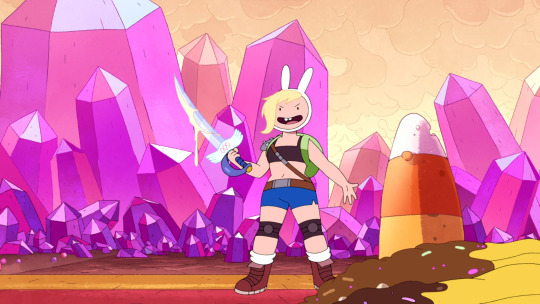
And, like, in general acting without thinking of the consequences.
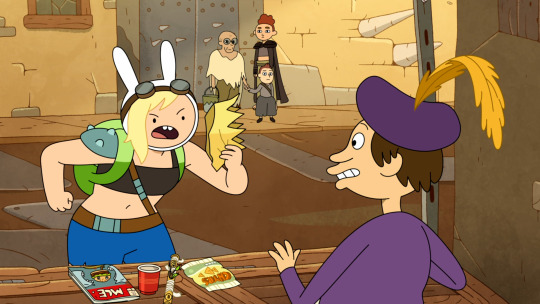
And at basically every step of this adventure, these kinda actions clashed against the reality of her situation. And it all started when she pointed out to her own creator that the outfit he designed for her is cute - but extremely unrealistic for an adventurer like herself

And from there we move to Fionna experiencing more and more of the harsh consequences of assuming everything should fit into her fantasies of heroes and villains
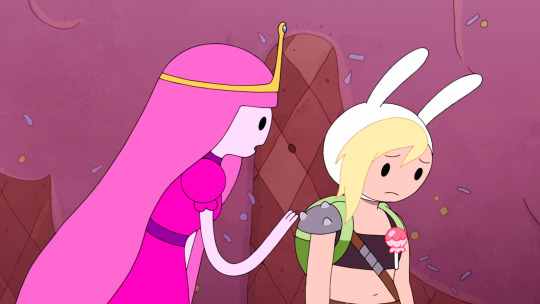
And that she should punch first and ask questions later
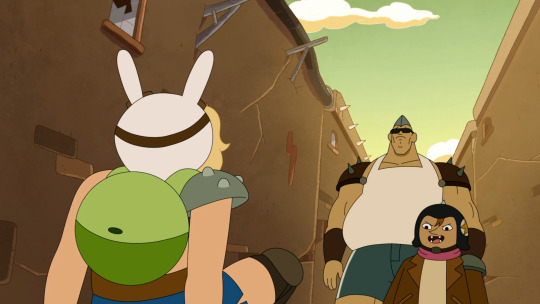
And in general that it’s always better to trust her guts over her head.

And with every one of her experiences, the bright and adorable outfit that is a reminder of her origin as God’s Most Self-Indulgent OC gets tweaked in more way - turning it into something that looks a lot more, for the lack of a better word, gritty. And also turning it further and further away from the outfit of her own literal fantasies.
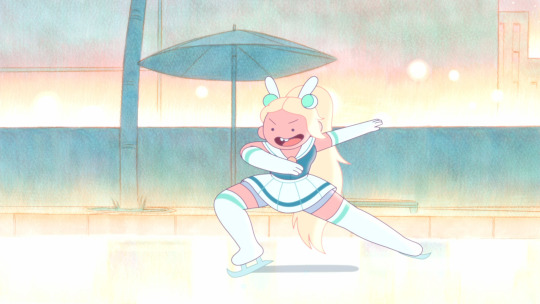
And all of these horrible traumatic experiences and the general dangers of the magical and very different world she’s in have all weathered down Fionna’s original optimism and eagerness and brashness that originally defined her and turned her terribly overprotective and scared instead. And it really reminds of how Simon’s own trauma weathered him down.
Turning him from a kind man with a passion for adventure and the fantastical and a powerful parental instinct to a miserable jerk who aches for mundanity and made a little girl cry
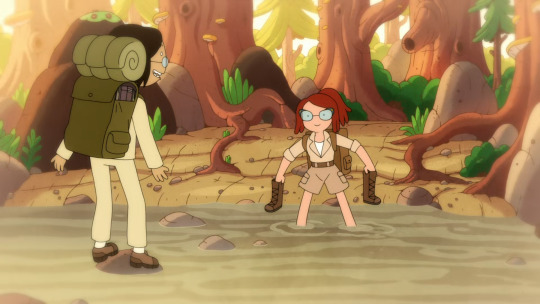


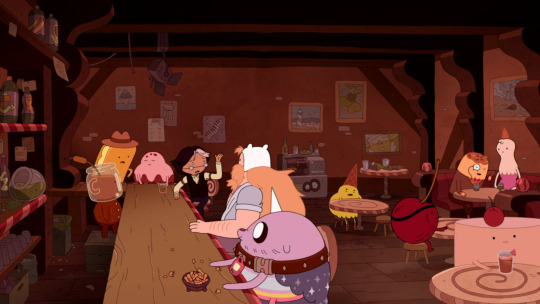


Until he got to his very lowest point.

So I’m guessing next up for Fionna is getting to see her regain some of her old identity that the Trauma has been tearing away at - getting back some of that cheerfulness and brash attitude and adventurous spirit. Because while it has put herself and her teammates and others in serious troubles - it’s also been a huge help at other times (especially as she's a good counterbalance to Simon ‘slow but dependable’ Petrikov)
She needs to find the balance, learning the lessons from her multiverse adventure without losing all the things that made her Fionna Campbell in the first place.
And I wonder if this development is gonna be paralleled with a return of some of the more ‘classic’ elements of her look - or if her outfit is instead going to diverge farther?
#adventure time#atimers#fionna and cake#fionna & cake#at#at spoilers#fac#fac spoilers#f&c#f&c spoilers#adventure time fionna and cake#adventure time spoilers#adventure time simon#fionna and cake spoilers#fionna and cake simon#fionna and cake series#fionna and cake show#fionna campbell#fionna the human#adventure time fionna#simon petrikov#simon adventure time
177 notes
·
View notes
Note
Would it make more sense to contribute money to my employers 401k to max out the match contribution or to instead just contribute a small amount and use the rest to pay off high interest debt or building an emergency savings (I have like 1.5 months worth of expenses saved and… $30k of credit card debt….). I was unemployed for a long time but now have a stable salaried job where I make enough to cover my expenses (credit card minimums, loans, groceries, rent, etc) and have a little left over that I divvy up between small treats (a movie ticket, a nice pastry, thrifted clothes), donation posts, and like an extra $50 credit card payment and I’m not fully sure the optimal way to use that small amount of money. I do need a small treat from time to time to not lose it (and socializing often costs money even if it’s a cheap activity) but maybe it’s better saving on getting a $10 movie ticket each month to potentially pay off my debt like a month faster a couple years from now? how do I create financial security without feeling like I’m putting my life on a depressing pause for a debt free future that won’t happen for a couple years (assuming I make the same money and don’t incur additional expenses)?
Yeah, you've hit on a really important piece here, which is motivation and long-term resolve. The Mr Money Mustaches of the world talk up the importance of stoicism and shit and preach reducing living expenses, but it's equally important to keep in mind what actively gives you enough hope, pleasure, and reinforcement to keep you going.
Cutting back on expensive nights out is one thing; removing all joy and socialization from your life and therefore nerfing your long-term ability to remain employed and earning is another matter entirely. Enjoy those movie nights out. Supplement with having friends over to stream something on your laptop and eat snacks, free museum days, you know, do lots of cheap shit in addition to the little treats, but dont deny yourself the treats. those arent extravagances, that's being ALIVE! and the only reason we aspire toward financial independence is so that we can live life as we wish to, rather than being owned by an employer.
Employer matches are pretty much a guaranteed double on your money, which is better than even paying off a loan in terms of earning potential. so I'd recommend socking away that 5% from your paycheck automatically, so that you never even have to think about it, and then budgeting any remaining expendable income on knocking out that credit card debt.
30k is enough to really hurt, especially with interest over time, but not so great that knocking it out is impossible. you can do this! make sure in particular to focus any unexpected income on paying down that debt. birthday money, tax returns, perhaps filling out some class action forms online, any little bit helps -- you may want to check out the Snowball Debt Repayment method, in particular, as a lot of people find it more motivating to have a few shorter-term goals. (Basically, if you have multiple credit card debts, focus on paying off the smallest one first, so you'll get the rush of having vanquished at least one beast).
Good luck!!
21 notes
·
View notes
Text
My sense is that Silicon Valley has developed in just the opposite direction. My dearly missed friend, Aaron Swartz, was arguably the most genuinely open-ended intellectual to come out of modern tech. And he hated living in Silicon Valley in the early 2000s. He used to complain (sample here - he would expound on this at great length if you prompted him) about how intellectually dull Silicon Valley was, how disinclined people there were to talk about ideas, and how much happier he was after he moved to Boston, a place where people actually cared about books. Aaron was a member of the first class at Y Combinator. However, his broader intellectual interests were not only irrelevant to founder culture as it was back then but made him an actively bad fit, so that he ended up wandering off in a very different direction. In fairness, he was an awkward customer in all the right ways, and might very likely have lit out for other places no matter what. Silicon Valley has changed remarkably in the intervening two decades. Its culture now centers not simply on technology but the exercise of power. Powerful founders and funders not only aspire to make lots of money, but to reshape the world along better lines. They see themselves as a political elite as well as a financial one, and they are looking to educate themselves, often in ways that reinforce their own values and understanding of their own benevolent role. They want to be formed, and accidentally or consciously form others too. Tanner talks a lot about the classic Greek concept of paideia (education/formation). Its most prominent elucidation, the Cyropaedia, was written by Xenophon to support Athenian conservatives, who favored the rule of the few, in their struggles with the democratic faction. Xenophon’s notion of elite education was the model for the “mirror of princes,” a genre of mediaeval texts providing guidance for the education of rulers.Latin texts were similarly bastardized in the nineteenth century to mould the young gentlemen who would rule the British Empire, and through them influenced the anglophile East Coast elites who populated the State Department and the OSS. And that helps explain the creation of a canon. Founders who model themselves on Augustus Caesar, and engineers who aspire to reshape the world in their image, will not find what they need to know in textbooks on optimization. Nor, however, will they find it in the cultural precepts of the mid twentieth century WASP ruling class. Those were different times, and different values. Hence, they’re crafting their own mirrors from found materials - science fiction, biographies of great men, rationalist and libertarian tracts, and books about themselves. And there are lots of the latter, reflecting and refracting their own culture right back at them.
30 notes
·
View notes
Note
Hey hey
Just wanted to send a m/m beefleaf prompt over with a modern AU coffee shop theme. Maybe there could be some little struggles and if you want to add smut, just go as you like ;3
#danmei fanfic club
He Xuan glances at the clock above the coffee machine and counts down 5, 4, 3, 2, 1. As certain as the sun rising in the east, Shi Qingxuan bursts into Caffeine at 12:01 exactly. The nepo baby who stole his job and the sole reason he'd condemned himself to work as a barista after five years of business school. Other companies were available, but He Xuan knows he will never be satisfied until Shi Wudu is destitute, or potentially cursed to work in a fast food restaurant.
Still when he sees Shi Qingxuan's bright smile and is surrounded by his boundless optimism, it is hard to remain focused on the plan.
'Ming-xiong I am having the worst day. The worst day!' Shi Qingxuan slams his hand on the counter to reinforce just how bad his day is.
In spite of himself, whilst making Shi Qingxuan's order, He Xuan asks, 'What happened?'
'What didn't happen! Pei Ming slept with the client again. Obviously he didn't call back and now, now the client wants nothing to do with us. My brother has just been screaming at me for an hour. I said to him, it's not my fault, I didn't sleep with anyone important. Then he looked at me really accusingly. I'm not sure why.'
He Xuan hands him his order, a caramel latte.
'It's a carp today!'
He Xuan nods as he turns away to wipe up the sides.
'You really like fish.'
He Xuan hears the smile in his voice and says, 'I find them calming.'
'Maybe I should get some fish for the office? Are you on dinner soon? Come sit with me!' Shi Qingxuan says, pointing to a nearby table, he sits and waits for He Xuan to join him.
Reluctantly, or enthusiastically, He Xuan can never quite trust his own emotions when Shi Qingxuan is involved, he takes the opposite seat.
'Ming-xiong, you're so smart, you really are wasted here.'
If anyone else said such things to him, He Xuan would know it as a slight. When Shi Qingxuan says it, it hurts his heart. Yes he is clever, but he is also using that cleverness to sabotage the man across from him at every turn.
'What do you want?'
'We need to get Pei Ming!' Shi Qingxuan sounds so serious, a grown man making promises most hadn't heard outside of primary school. It's sickeningly endearing.
'What's in it for me?'
Shi Qingxuan replied, with all sincerity, 'I'll buy you a fish!'
He Xuan pauses, contorts his features to make it seem he is truly pondering such a request, after a sip of Shi Qingxuan's overly sweet drink, he replies, make it 2.
19 notes
·
View notes
Text
A little, not very polished ramble on Fukuchi and political theory, initially meant to be the answer to an ask questioning what I thought of the last chapter but posting separately because it ended up having little to do with the actual chapter.
This arc is good. I mean, the politics dilemmas it tackles are real and relevant (or maybe it's just me and loving politics discussion, that's a real chance too). Themes and interrogatives such as whether the eradication of states is possible; the critic to democracy in favour of a single authoritarian leader as the optimal solution for citizens' wellbeing; the utilitarian reasoning behind the justification of sacrificing a few in order to ensure the greatest good to the most; the trolley problem– would you be willing to sacrifice five hundred in order to save two-hundred and ten million; the general interrogatives on why war happens; those are all real questions that political scientists try to give an answer to. I feel like bsd still hasn't cleared up where it stands in relation to these interrogatives– a lot of it is going to be determined on what Fukuzawa is going to do with his role of Army of Mankind's leader, whether he's going to accept it or something else. But I'm EXTREMELY curious to find out how the author will answer them and the worldview bsd is going to propose accordingly.
So far, bsd has seemed to me to propose a nihilistic-political realist-nationalist worldview: good and evil are meaningless binomials (Oda in his last speech to Dazai), every man acts in their own interest and the strongest prevails (Teruko in chapter 76), a strong sentiment of pride for own country that often translates in denigration of foreigners (the way all characters from other countries are villains, a somewhat reverence for military police (though other people have interpreted it being exactly the opposite))¹. Such reading of bsd is reinforced by Fukuchi's speech in chapter 85, with Fukuchi's character being made overall unsympathetic to the reader. At that point, I was like “Ah! Of course! The nationalist-realist manga makes of the anarchist an unsympathetic terrorist!” (and I'm quite confident I'm not misinterpreting by saying he was framed unsympathetically, at least as far as his ideals go. A lot of emphasis is put on his role of torturer, and the story protagonist looks very upset by it, which feels like inducing the reader to be as well).
But perhaps I was mistaken? Maybe I really jumped to the conclusion by believing this arc would have turned in an anti-anarchism morale. And even though it's still too soon to say it won't, in the arc conclusion we saw so far anarchism was at least framed in much more favourable lenses. Episode 5x11 and the last chapters have vastly subverted the lenses the reader is called to see Fukuchi under, and it's been SO interesting to see. Because Fukuchi isn't made unsympathetic, and as consequence his anarchist ideals aren't being framed as the senseless ravings of the villain anymore. Which I didn't see coming, and was pleasantly surprised by!! Fukuchi's desire to stop war by erasing all states, if not feasible, is now at least being framed as sensate and even noble; which is quite silly given that it's the same ideals he was carrying on in chapter 85, just with more details on political theory and positive lenses. Moreover, the world integration and creation of a single-state is framed as being a natural and unavoidable progression of history, which is CRAZY to me. I mean, it's crazy because it wholly contradicts the nationalist worldviews I found previously quite solidly established in this manga (which, again, might be just a big misreading on my side but. Wow.). Double crazy because there's about one million political scientists who would disagree with it… I don't think it's that much of an affirmed theory anywhere? If anything, because it's got some pretty strong historical negations: I'd like to ask Fukuchi how the gradual disgregation of states reconciles with the dissolution of the ussr and the objective difficulty to maintain wide pieces of land unified, the equally objective difficulty to concretize the goal of European integration, the new wave of nationalism in the world and new countries actively seeking independence rather than cohesion. In the end, Fukuchi seems to propose this insane hybrid of anarchism and authoritarianism with the negation of all states and a single leader detaining all the power (aka no separation of powers, the most rudimental basis to democracy), which sounds absolutely insane to any sensate person but I suppose can even make sense in the bsd world where there's no end to craziness.
I'm very very curious to see how the army of mankind's leader thing is going to be solved. Because if Fukuzawa accepts it, that's quite affirming that the best outcome for society is an authoritarian, antidemocratic regime. And although Fukuzawa himself was shown to be critic of that much (“Even if war did cease to exist, what would remain in that world is a single leader– a dictator. History has shown time and time again that dictatorships only rot.”, chapter 112), him being cornered to ultimately accept the role would seem to suggest that THAT is the only possible answer. Which is an odd subtle not-so-subtle authoritarian agenda which would be… Interesting to see affirmed? but at least that one *is* coherent with the previous signs of nationalism. That said, again, Fukuzawa was critical of it, so I'm not sure he will be willing to follow through (and I find it hard to image a new bsd where world order has been changed. And with Fukuzawa on top of the world, for the matter.) But Fukuzawa did not crush One Order… And overall the narrative seems to have trapped him into yielding to take on the role… Aaaahh, I'm just very curious from a political theory standpoint to see how the author is going to untangle the dilemma!!!
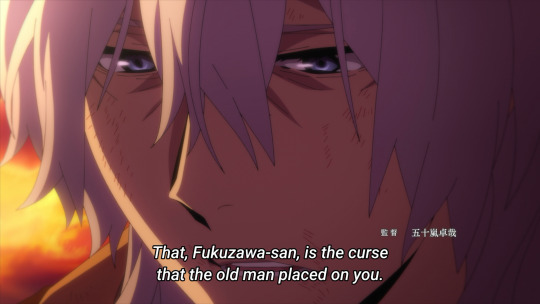
¹ In parenthesis I'm only bringing up the most notable indicators, but those doctrines are an underlying pattern of the whole manga and several events can lead back to these beliefs; for example, how Atsushi's abuse by the hand of the orphanage director is not morally condamned and even implied to have made him stronger, the emphasis on the great power of Japan (here emblematically represented by Yokohama) as a small country / city able to stand up against several evil foreign powers that make repeated attempts to destroy it, and more.
#Ah yes posting at 4am when the dash is dead and everyone is sure to see it#ōchi fukuchi#yukichi fukuzawa#bsd#bungou stray dogs#bsd analysis#mine
46 notes
·
View notes
Text
A Coat Fit for a Hersir
By Doña Ashildr inn Harfagri, 2024
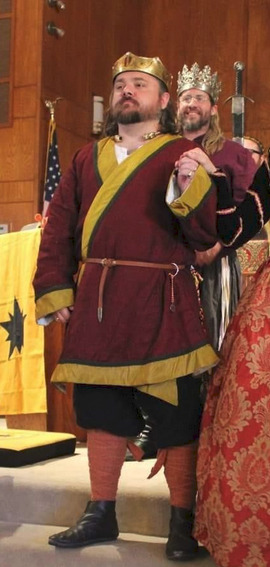
Purpose
This coat is constructed for HE Brynjólfr Austmannaskelfir, Baron of Bonwicke, to wear at his baronial investiture with HE Beatrix Funteyn. Brynjólfr requested a Hedeby coat and referenced a red and gold coat frequently featured by the living history society Swehanaz. The featured coat is a cross-body coat that appears to fit fairly slim through the upper torso and arms while flaring past the waist and knees to allow for freedom of movement.

Vendel Period impression by Matt Bunker, from a pattern created by Swehanaz member Dave Huggins[1]
This style of coat is depicted clearly on the Sutton Hoo helmet in the design commonly referred to as “The Dancing Warriors” where the coats appear to have contrast, decorative facing around the edges of the front opening, the hem, and the cuffs, along with what could be trim along the outermost edge.
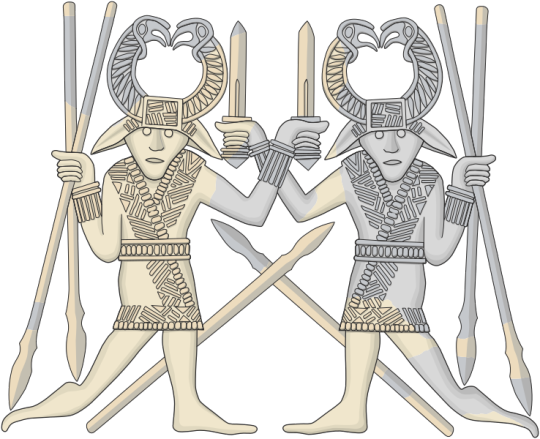
Detail of a motif on the Sutton Hoo helmet, commonly referred to as the Dancing Warriors.[2]
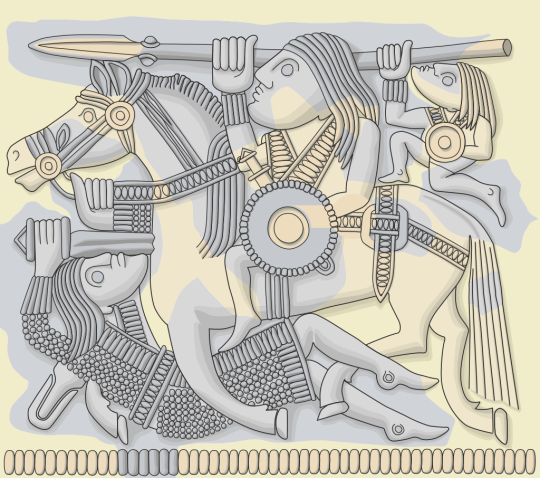
Detail of a repeating motif on the Sutton Hoo helmet, commonly referred to as the The Rider and Fallen Warrior. [3]
Design
Rather than finding or buying an existing interpreted pattern, I decided to interpret based on the Dancing Warriors and the Rider and Fallen Warrior, as well as other similar garments. Foremost among my other references is the Bocksten tunic[4], well known for its simple, geometric construction and use of triangular gussets to add fullness to the skirt of the tunic. For this interpretation, I opted for a single, rectangular back panel, mirrored trapezoids for the front, triangular gores to insert into the side edges for fullness, and two-part paired trapezoids for each sleeve. The division of the sleeves was made after laying out a cutting diagram and realizing that, given the fabric width of the most precious, outer layer of fabric, splitting the sleeves into a larger and a smaller trapezoid would better optimize my cutting and reduce fabric wastage. As with many of my patterning decisions across early period garments, I opt for the most efficient use of fabric for my modern fabric widths as the tailors of the time may have opted for efficient cutting diagrams for their own fabric widths.
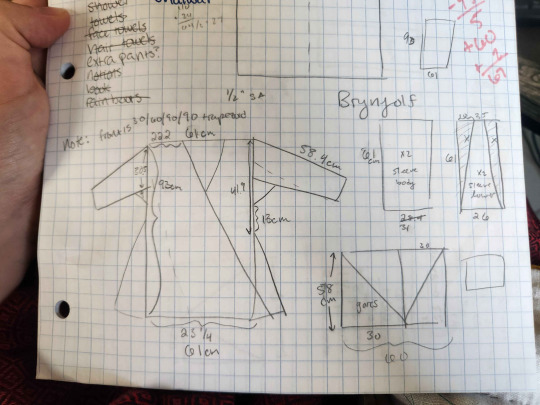
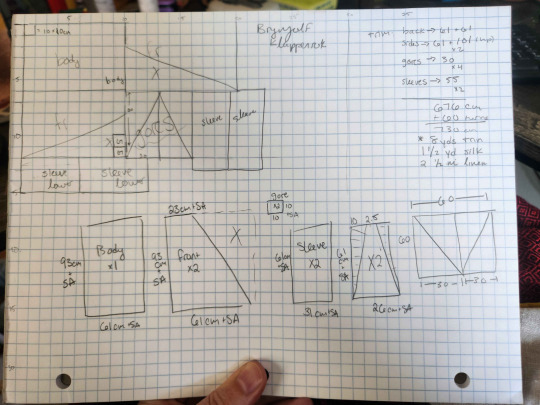
The recipient provided a red and black diamond weave linen for the outer layer, white linen for the lining, a gold silk for the contrast edge, and green woolen trim for accent. The recipient prefers triangular gores to side slits and prefers the look of trim “joining” the contrast silk edge to the main outer fabric. Embellishments such as trim or embroidery are common in Viking Age and medieval garments along seams and other potential weak areas, rather than just as decoration. I have also found anecdotally that seams which I have reinforced with either decorative stitching or by laying trim across the seam in question wear out less quickly than other, similar seams on my own garb. I speculate this is due to the application of trim spreading the force applied to the seam across two more lines of attachment, where the trim is tacked down along the two joined fabrics.
One frustrating design element is the presence or lack of the decorative edge along the back of the neck. As both designs from the Sutton Hoo helmet depict the torso square to the viewer, neither gives a clue to this design element. Many interpretations of this garment forego the decorative edge along the back of the neck entirely, but my original plan and design for this garment include this design element. As I have opted to go with a non-tailored design consisting of rectangles and trapezoids, the back of neck portion would be a simple rectangle. Additionally, the continuous piece of wool trim across the shoulders to the neck may ease some of the stress along the shoulder seam and yield a longer-lasting garment by distributing the stress down the front and back vertically.
After the design was finalized with the recipient of the coat, I came across The Klappenrock: A Viking warrior's Coat From 10th C Haithabu, an A&S paper by Elska á Fjárfelli (mka Susan Verberg) which highlights specific analysis of the extant fragments and provides fascinating details surrounding the cultural milieu that may have produced this coat as well as options for different interpretations of this coat.
Method
After an initial fitting in muslin to confirm length and mobility while wearing, the pieces were traced with chalk onto medium weight white linen[5] and the red and black diamond linen[6]. This choice of outer is remarkably appropriate to Haithabu, where approximately 6 fragments of diamond weave twill fabric were found and at least one was dyed red[7]. While all the colors were chosen in order to match the heraldry of the barony with Or, gules, and vert. Due to the looser weave and drape of the diamond linen, I experimented on scraps with different thread, gauges, and methods of sewing.
By machine with polyester all purpose thread
By hand with polyester all purpose thread
By machine with cotton thread
By hand with cotton thread
By machine with linen thread
By hand with linen thread
All attempts to sew the fabric with a machine resulted in unsightly puckering and even snagging of the delicate weave of the fabric, no matter the tension, new needle, or foot I switched out. Hand sewing with the thinner cotton and polyester threads did not produce sturdy seams and in the case of the polyester thread, actually sliced through some of the weft fibers when put under moderate stress. Sewing by hand with a thicker thread (the black 80/3 linen I had on hand) posed less damage to the base material and produced less puckering and was the final decision. Partway through the construction process the 80/3 was replaced with 80/2 due to availability issues.
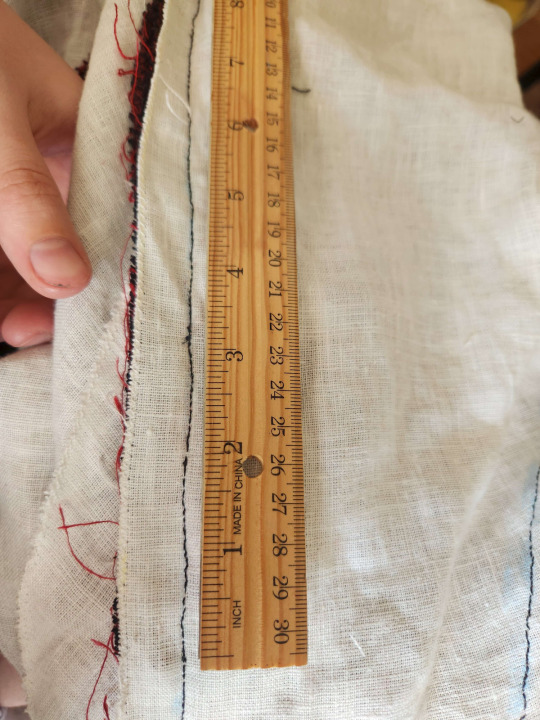
After cutting out the linen pieces, I ran them all through the sewing machine to overlock the edges so they could be safely transported as I handsewed anywhere I could. This is the only machine sewing on the garment, and the majority of it was trimmed off during the process of felling. The machine sewing is obviously not a period technique.
The coat is constructed by suit lining, so that the white linen's density and structure can reinforce all seams. The construction seams are backstitched, as seen above, with an average gauge of 8-12 stitches per inch. While the majority of construction stitches in archaeological finds seem to be running stitch[8], I did not yet trust my hand sewing to be sufficiently sturdy with just running stitch. The seams around the shoulder, armscye, and sleeves are flat felled open with a whip stitch as seen in Haithabu and York to reduce bulk, and the seams along the gores are run-and-felled as bulk is less of a concern.
What Did I Learn?
Next time I make a garment of this type, I will use a running stitch for the low-stress seams such as the sides and underside of the sleeves. I will also round up the front corners of the coat to prevent the “handkerchief” effect produced by the hanging as-is. I would also like to make one of these with fur accents one day, and to make one in wool to see how it affects the drape of the garment.
Even though it is not a period method, I will continue to use the sewing machine trick to reduce the wear and tear on the edges of the fabric. Modern commercially-available fabric is made to a lower standard and thread count than fabric in period and is thus more prone to fraying. In addition, my day job is not tailoring or sewing so these kinds of projects tend to be more on the move and are subject to more wear and tear while in progress than they would be if worked on only in a tailor’s shop.

Photos by Sigmund Ulfsson
Retrieved from https://www.facebook.com/Swehanaz/photos/pb.100080129846623.-2207520000/658095265631323/?type=3
By Goran tek-en, CC BY-SA 4.0, https://commons.wikimedia.org/w/index.php?curid=83175424
By Goran tek-en, CC BY-SA 4.0, https://commons.wikimedia.org/w/index.php?curid=95523565
Bockstensmannen och hans dräkt, Margareta Nockert m.fl. Hallands länsmuseer, Halmstad och Varberg, 1997.
ILO19 Medium weight white linen from Fabrics-store https://fabrics-store.com/fabrics/linen-fabric-IL019-bleached-fs-signature-finish-middle
Burgundy and Black diamond linen from Woolsome https://www.woolsome.shop/product/linen-fabric-diamond-black-burgundy-ld-11-02/#1702727755128-d097131d-b3cd
Hagg, Inga (1991) Textilfunde aus der Siedlung und aus den Grabern von Haithabu. [Textile Finds from the Settlement and from the Graves of Hedeby]. Hedeby-Ausgrabungen in Haithabu [HAGG 1991] Retrieved from https://www.vikingage.org/wiki/index.php?title=Cloth_Weaving_Patterns
Baker, Jennifer. Stitches and Seam Techniques: Seen on Dark Age / Medieval Garments in Various Museum Collections. 2009, retrieved from https://ia803100.us.archive.org/23/items/Stitches_And_Seam_Techniques/Stitches%20and%20Seam%20Techniques.pdf
#society for creative anachronism#historical costuming#historical reenactment#viking clothes#viking#arts & sciences#a&s#sca#garb
5 notes
·
View notes
Text
i feel like i'm slowly linking pretty much all of my banger shows to generational trauma (i.e bojack, succession, invincible) or some otherwise maladaptive response to the often totalitarian shaping that children who have been parasitized by vicarious idealizations suffer — however, as i've come to realize that the bear (a show i made a previous meta on when i sort of scented this notion but couldn't really articulate it), embodies this in a completely transformative way.
the bear may be about generational trauma, and though this initially sounds counterintuitive, it's not a show about carmy's generational trauma, its a show of camy's generational trauma.
the show doesn't explore the ways carmy's been wrecked, it moreso uses them to give character to his dysfunctions, to help the viewer see corporeal manifestations of the chaos brewing inside of him. the fanfare of carmy's life is the bear, its all the bombast and theatre of life's torture porn tendencies looming over his shoulder and rotting the floorboords and having its poison drip through, it's all the regrets and flashes of shame and brokenness slowly clawing through anything good in his life bc good things are brittle and unpredictable and detract from his value as a person, the utility he's found in being untouchable and cold and practically mechanical, and the way that makes one feel like all of the suffering was worth it.
it's carmy letting his internalizations of imperfection, from his family, his relationships, himself, his life, dictate what should define him. carmy circumventing feelings of helplessness with compulsive, neurotic control, aiming to undo the damage that chaos wrought through obsessive perfection.
its him eviscerating the [personal] value of his deep need and capacity for autonomy and forgiveness and peace, by reinforcing the same parasitic paternalisms he was fleeing from in the first place.
its him going from his mom to his mentor chef.
its him becoming what destroyed his chances to be human, destroyed his chances to be him. his own person, with individual purpose and intrinsic meaning and happiness.
that sort of self-dehumanization is what carmy is dripping into syd. like yes they have similarities, i'm not trying to deny that, but i feel like the 3rd season, especially the last episode, highlighted why syd x carm wouldn't be an optimal or even relevant consideration for their current dynamic, and that's bc carmen sees sydney as an extension of himself. she's all the things that validate his: maybe this is worth it, maybe i'm supposed to be a chef, its actually okay that i'm not functional bc now i get to be useful and revered and mean smth in the world and i'm no longer weak and useless deadweight.
now, now, i've proved myself, i've embodied the predetermined mould, i've surpassed it. i've become real, finally claimed autonomy.
its him seeing their similarities as reason to mould her in turn, as the only thing she needs. carmen reducing himself to apparatus and so reducing her in turn.
its a perversion of empowerment, accessing control through wielding it against others.
with syd exhibiting certain tendencies bc carmy spurs them from her. like sydcarm both having panic attacks, both being hyperfocused on stains, carmy wanting a star, not just bc syd acts as the northstar of his craft but bc he wants to prove himself. he wants to be excellent too. or them both snapping at softer, caring figures like tina when frustrated. its sydcarm degrading others under stress, sharing memories of hostile bosses, bosses who didn't appreciate them, whose mentorship was selfish with care and dignification and belief — made them feel small and claustrophobic and marginalized by one's own worst traits - by dysfunction willingly embraced.
and now you want out but you're also ambitious like syd, or proud like carmy, and its your pull to chaos vs your pull to happiness splintering you. now anything good is just a cruel fleeting thing that reminds you of what you won't let yourself have. now, people can only try reach out to the bear, coax it.
enter claire, who often gets flack for being a manic pixie dream girl and unrealistic, but when dealing with carmy, she revealed smth very primal in him, was palliating wounds he's let fester into core beliefs. like think abt it, claire is gentle, and claire treats carmen like he is gentle, fragile, she affirms his worth constantly and perpetually reassures him, whether intentional or not, claire aims to soften his wounds, aims to coax him out of his armor. she recognizes the depth residing in carmy, that the bear is equally damaged as it is brilliant, yet senses that a lot of that was mangled by malignance and flagellation. she attempts to let the bear shed his skin, remember who he is again. that someone cares abt him, both the chef and the boyfriend, the professional and the life of the party, he's allowed to have both. him the prodigy, the baby lamb. but claire spent so much time nursing the deer, by the time her own interiority could have room for growth, carmy had already cut her off, the sheep back in bear's clothing.
claire is the desperate attempt to reach someone backfiring completely, the incongruence between want and need, and how this can destroy you from the inside.
and the funny thing is that, neither claire nor the bear are carmy's actual need, when — beyond a gf not being able to fix carmy — he still kicks and screams at love and care despite desperately needing them. he's still the one who overindulged in the perfect patience of claire's love and validation, yet spurned it over how incapable and human it made him feel, still didn't want to lose control of himself, his personhood, his value.
he's still trying to imbue this same perfection into those closest to him in the kitchen, still insulating himself in that headspace, a wounded animal ensnared by a deathtrap, the bear stuck in his own freezer on his debut day.
its a trap that kills, and as carm embraces his confines, they throttle harder in turn, capturing those reaching for him in their rot.
it started with donna and passed down to carmen (who sought it in his mentor) and is dripping into syd. into richie, into claire, its carmen cultivating dysfunctions in all those beholden to him, dependent on his guidance, support or love.
its beyond generational, its a malignance, a pathogen, and although carmen may not realize how his conflation of perfection and value are lethal to him, its smth slowly killing nonetheless, mauling the warmth and love and soul of the kitchen, just as it slowly kills it in him. the bear killing the bear.
#the bear#the bear meta#carmen berzatto#carmy berzatto#the bear s3#claire the bear#sydney adamu#yes carmen is excellent and taming the bear would mean fulfilling his dreams#but the bear is also an animal#and animals often can't be tamed#the bear fx#the bear season 3#the bear hulu#syd adamu#carmy the bear#original post
10 notes
·
View notes
Text
Before The Beginning ✨️Color Theory✨️
Okay, this will be pretty long, tldr: everything is a mirror of everything. All opinions are my own after I was caught between the twin forces of memories from my art and film theory classes. All screenshots thanks to the great folks at cap-that.com
I'm going to start after "Let there be light" for obvious reasons, up until that point the lighting is bright but cold and white. The nebula gives us a diegetic (in scene) reason for the shifting and intense colors but I think it's really interesting to see how it was used to reinforce this universe-changing conversation.
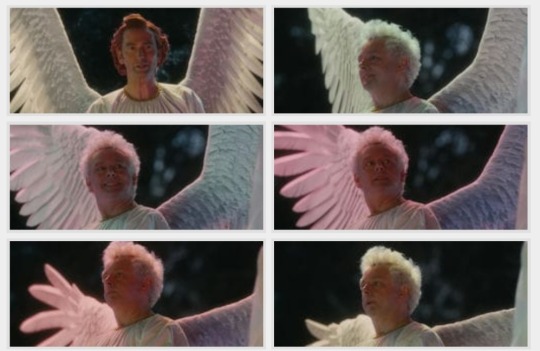
"Look at you, you're gorgeous!"
The nebula is only beginning to throw off color, and what's the first thing that happens? Makes it appear like Aziraphale's wings are blushing when he realizes the compliment was not meant for him (and seriously, how adorable is he).
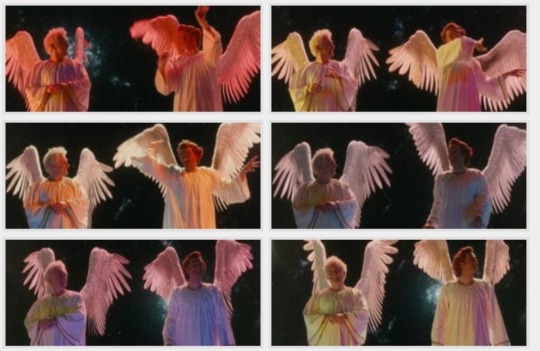
As the conversation winds on and Crowley excitedly decribes the nebula, colorful light is increasingly projected onto the angels, but not the background. This visually ties them together and the intensity of colors seems purposeful as well, since they immediately begins to cool and dim as Aziraphale explains the less-than-stellar purpose behind the star factory.
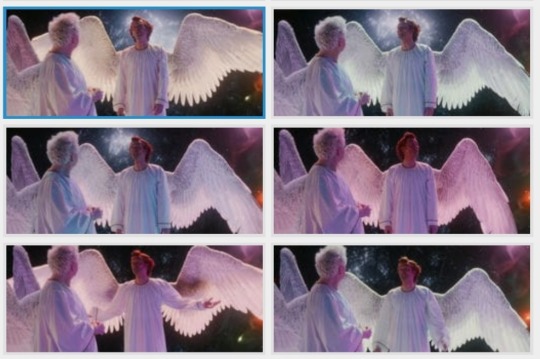
"What's the point in creating an infinite universe.... if you're only going to let it run a few thousand years?"
Two really interesting things happen here. A star-burst reminiscent of a halo explodes and dissipates behind Angel Crowley's head, and when his wings droop in disappointment, a small cloud of red can be seen appearing behind his left wing.
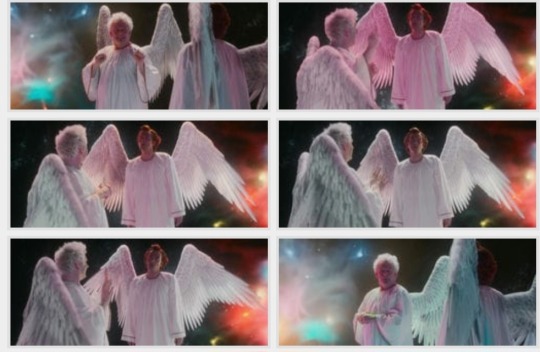
As Aziraphale attempts to explain the ineffable but all-important Earth and humans, he begins to gather an aura of gold, baby pink, and baby blue. Crowley's red cloud of confusion also continues to intensify as he listens.
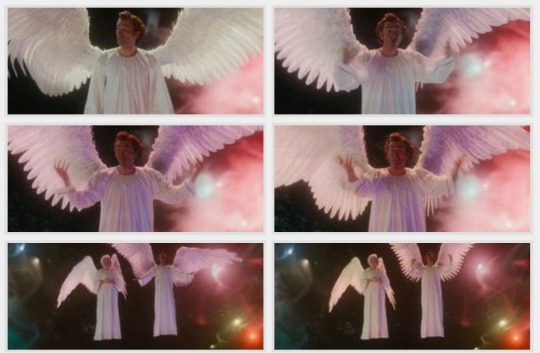
"But that's idiocy!"
The reddish clouds of confusion and doubt really begin to pick up speed now as Angel Crowley vents his frustration and beats his wings hard in agitation (also, shout out to how ruffled his feathers become because it's a whole mood in itself).
Here's where things get dangerous.
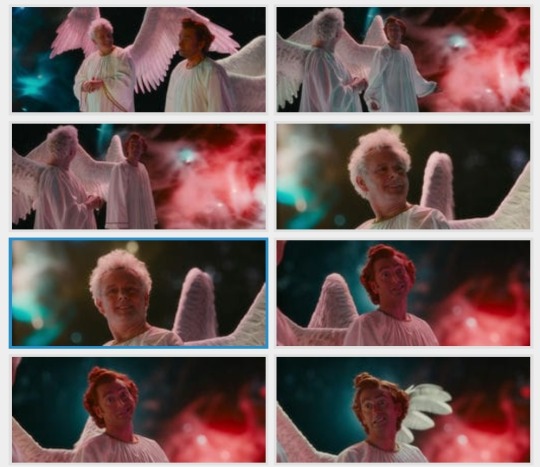
"Someone has to say "Look Boss, this is a really terrible idea..."
The red cloud has become a roiling crimson storm filling half the frame beyond Crowley and casting dark red light on his face. Meanwhile Aziraphale's background stubbornly hangs onto its cool colors, now opal and turquoise.
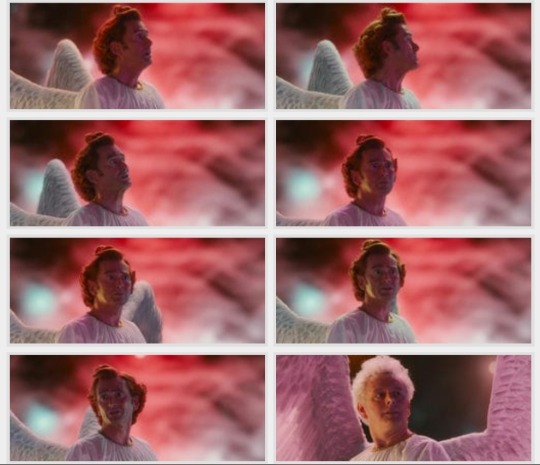
"I don't suppose anyone could object to me putting a note in the suggestion box..."
The nebula's red gas has now completely filled Crowley's frames, surrounding him on all sides. The next interesting thing occurs behind Aziraphale.
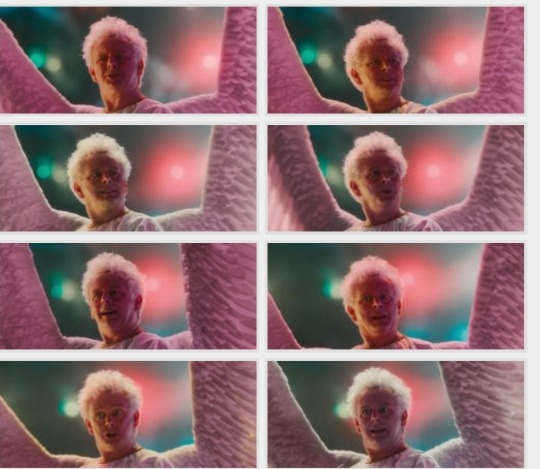
"I don't think it's our place to start suggesting...!"
In contrast to Crowley's red cloud of doubt, I've been calling this Aziraphale's red ball of anxiety (hello my old friend). He is deeply perturbed by this line of conversation and as he is explaining that the Almighty doesn't have, and likely wouldnt appreciate a suggestion box, this red light floats from behind his wing to behind his head (again, mood).
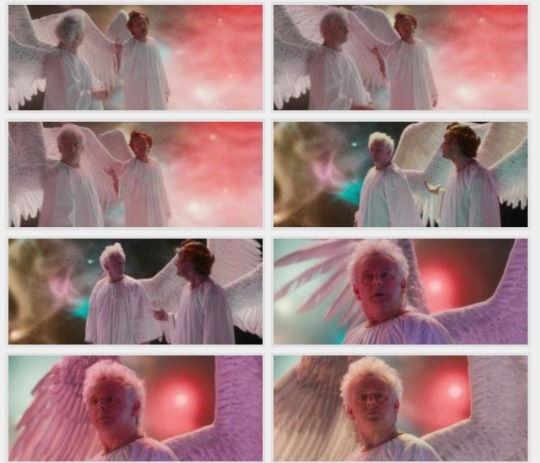
"If I was the one running it all..."
The saturation of Crowley's red background has lessened a bit, but Aziraphale's Red Ball of Anxiety reaches its peak intensity at this statement as Aziraphale nervously casts his gaze around to see if any other angels heard this borderline blasphemy.
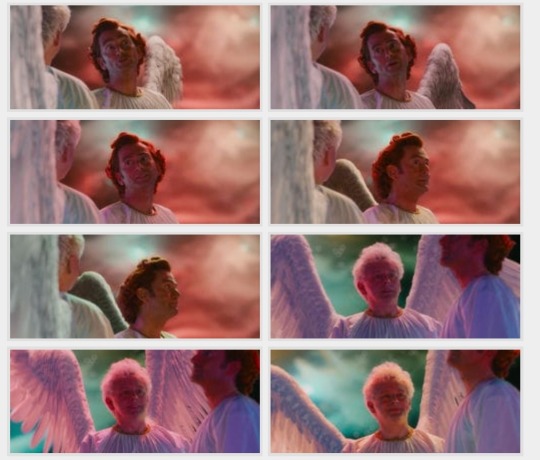
"How much trouble could I get into just for asking a few questions?"
While Angel Crowley is still firmly framed by the red cloud, its disrupted by pale light cast by baby stars or proto-planets, as if it was being leavened by his irrepressible optimism.
For his part, we leave Aziraphale in a riot of both warm and cool colors: golds, greens, pinks, purples... This makes absolute sense to me, seing as it highlights the riot of emotions Aziraphale goes through, beginning with raw concern for Crowley's safety but resolving to a frankly breathtaking amount of affection and admiration. Seriously, zoom in and become unwell with me.
Well, that's all folks! Cheers to you if you stuck it out this far, hope literally any of my rambling and possible derangement was interesting to literally any one else 😅
#good omens#good omens meta#aziraphale#loves#anthony j crowley#the angel who will become crowley#color theory gonna color theory
41 notes
·
View notes